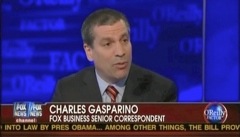On last night’s ‘O’Reilly Factor,’ Fox Business Network reporter Charlie Gasparino claimed that during his time at CNBC, General Electric Chairman and CEO Jeff Immelt suggested to senior CNBC staff that they were being too hard on President Obama. Gasparino did not say that it became official CNBC policy to tone down criticism of the president. But he claimed that “the question of whether they were being fair to the president was brought up” and that he had “never heard that before.” Keep in mind that at the time GE stood to make a whole lot of money from some of Obama’s key policies. NBC and its affiliates have conspicuously shilled for such policies before. Even absent an official NBC or CNBC policy criticizing the president, the incident demonstrates a profound lack of journalistic neutrality. There has always been a looming conflict of interest at GE’s television arm. The possibility that higher-ups suggested reporters go easy on the president raises all sorts of questions about the abilities of NBC, CNBC, and MSNBC to fairly and accurately report the news. O’REILLY: You worked at CNBC, that’s a business network. GASPARINO: Sometimes opinion. O’REILLY: Did you see left-wing stuff there? GASPARINO: Well it was interesting. There was – and it turned out to be true, I think the New York Post reported it – there was this issue where Jeff Immelt, chairman of GE, which used to own NBC Universal, called in some of the senior staff, and clearly was worried, according to the people I spoke to who were in that meeting, about the possibility that we were becoming too anti-administration. This was when the Obama administration first took over, and some of the spending plans came out, and the markets reacted. O’REILLY: So Immelt himself intruded on the editorial position of CNBC because he felt that you weren’t giving Obama a fair shake? GASPARINO: They will deny it, officially, but from what I understand, and I spoke with people there, people got called into this meeting, and they were basically, not exactly read the riot act, but the question of whether they were being fair to the president was brought up. I’ve never heard that before. The most interesting aspect of Gasparino’s claim is the circumstances under which CNBC’s editorial position was reportedly brought into question. Gasparino is claiming that when the Obama administration first released its spending plans, markets reacted poorly, and CNBC, being a business network, reported those facts and, presumably, opined that Obama’s spending plans had something to do with poor market activity. But General Electric at the time was hoping to profit handsomely from policies that would benefit a few companies, including GE, at the expense of the majority of the economy. Cap and trade is a perfect example. According to the Washington Examiner’s Tim Carney , “GE has also launched a venture dealing in ‘greenhouse gas credits,’ which are literally worthless until Congress starts limiting greenhouse gas emissions.” GE has extensive investments in alternative energies, the values of which would skyrocket under a plan making fossil fuels more expensive. Cap and trade will hurt most businesses by raising the cost of energy, which in turn raises the cost of just about everything. So while GE stands to gain, most businesses stand to lose. GE has invested in government, so to speak. It has made investments that will only pay off if and when the federal government intervenes. So while the larger business community may be crying out for a free market, GE stands to make far more money in a decidedly unfree market (at least in a few prominent sectors). If CNBC were to channel the attitude of the business community generally on many prominent Obama initiatives, it would actually be running against the grain of its parent company’s financial interests. All of this makes Immelt’s intervention in CNBC editorial policy very fishy. It once again raises the specter of a massive conflict of interest at General Electric’s communications arm. Yet even reporters and commentators who claim concern about journalistic ethics – especially when it comes to “corporate media” – have adopted a see-no-evil attitude towards this conflict. NB’s Matthew Sheffield wrote in 2008 : We often hear lefties rage against Rupert Murdoch for allegedly harming the objectivity of his employees by forcing his “right-wing” politics on them. At the same time, however, our journalistic bluenoses routinely turn a blind eye to flagrant corporate-sponsored journalism such as “Green” or the equally disturbing case of an Australian company literally banning its employees from criticizing its own “Earth Hour” campaign. We all know the reason why media-beat reporters are unconcerned by such actions of course. It’s because they support liberal policy goals. Sadly, in the eyes of many left-leaning journalists, good journalism is liberal journalism. As troubling as the fact that NBC News has willingly prostrated itself before its corporate master is, it’s probably less disturbing than the fact that the entire “Green” campaign seems to have been cooked up by NBC Universal’s own parent company, General Electric, as a way to make money for itself… Is “green” journalism the new yellow journalism? It’s sure starting to look that way. The slogan for the campaign is “Awareness. Activation. Results.” A news company should not be trying to lobby for “results.” NBC and MSNBC owe viewers a tremendous apology. Add CNBC to that list, but don’t expect an apology.

See original here:
Charlie Gasparino: GE Execs Encouraged CNBC Staff to Go Easy on Obama
























